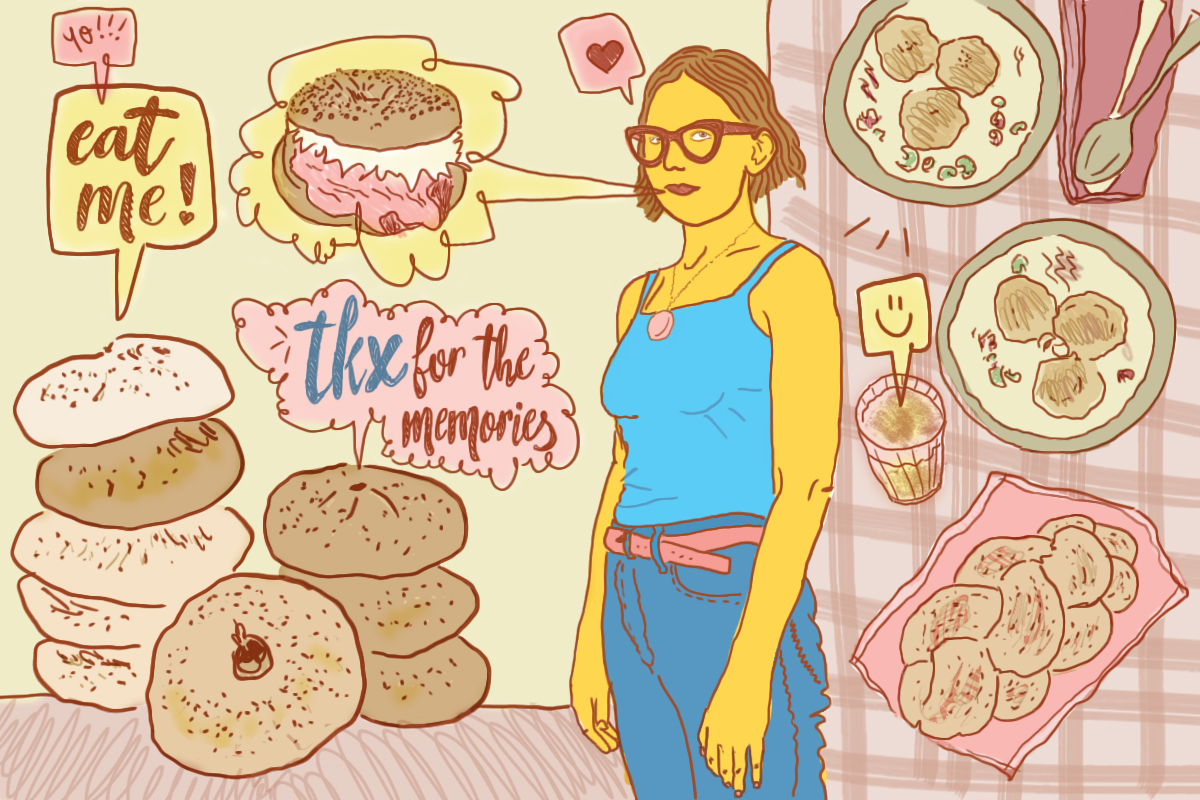Growing up in a Conservative Jewish household meant that in addition to being fed various kinds of kugels and my mother’s homemade matzah ball soup, I was force-fed a long menu of kosher life principles. Fleishig (foods containing meat) and dairy dishes were eaten with separate silverware and plates, pork and shellfish were barred, and cheeseburgers were contraband. All things Christmas were illegal as were goyish (non-Jewish) boys.
On Friday nights we celebrated Shabbat with our third cousins once removed who lived up the street. As the sun set, we lit candles and chanted prayers together, relishing in the onset of the weekend. A collective devouring of a delicious Jewish meal was occasionally interrupted by a random chirp by George, my cousin’s grey cockatiel. Dessert was always, without fail, butter cookies with a single chocolate chip in the middle, a simple delicacy created by our great aunt Frida.
Back then, I was surrounded by faith. It was a major part of my everyday life. It hung in the doorposts of every room in our house in the form of a mezuzah, a set of prayers wrapped in a ceramic case. I associated it with the smells of my mother’s cooking, the sounds of my grandmother blessing the Shabbat candles, the pages of old bibles I pretended to read during services, and the Hebrew lessons I received in Jewish day school.
Yet as I grew older, I lost touch with some of the principles I once held onto so tightly. As my parents’ marriage began to dissolve in my teenage years, so did my connection to the Jewish faith. We stopped keeping kosher, celebrating Shabbat, and going to temple. My sister went to school far away and my dad left home for life in a different state while my mom stayed in New Jersey and I went to school in the midwest.
As I entered early adulthood, I found it challenging to relate to my family, my faith, and myself. Sure, I joined a Jewish sorority in college and continued to attend services on the High Holidays, but I stopped seeing Judaism as a valuable part of me. In a way, I kind of resented that part of myself as it was a large part of a happier childhood that no longer existed. The truth is I lost sense of a lot of my identity. Back then, I didn’t acknowledge the resentment and growing discomfort I felt. Instead, I chased external happiness around until my late 20s when I finally cracked.
It was amidst a summer of depression brought on by a break-up, a surgical procedure, a dog attack, and a death in my family that fragility, and ultimately faith, found me when I least expected it. As I began to pick up the pieces of my life, thanks to psychotherapy and self-care, I learned how to turn inwards, acknowledging the parts of me I once subconsciously ignored. Slowly, I started to explore, better value and ultimately honor all the different parts of my identity that make me the special person that I am.
Part of this self-celebration has involved the devouring of lots of Jewish food: bagels with cream cheese and lox on Saturday mornings from Frankel’s in Brooklyn, brunches with my dad at Russ and Daughters café, and late night trips to Katz’s Deli for a corned beef sandwich and a potato latke.
Sure, I frequented these places and ate these dishes before I was depressed. But now I eat them with an unbridled sense of passion and excitement. They remind me of where I come from and they bring me joy because I am now celebrating all parts of myself. As I have pulled myself out of depression, eating these things has given me a growing sense of comfort.
In time, food has become a strong part of my healing process. It has been one of the tools that has brought me back to life and served as an accessible way to reconnect with my Jewish identity, as opposed to other Jewish rituals that often feel more sterile or serious. Connecting with Judaism through food culture has relieved some of the strict, more conservative principles I was raised with, and in turn made it more approachable and fun.
Recently, my therapist recommended I find an inclusive Jewish community to join. So, I reached out to a Jewish friend who put me in touch with a group of young women who are also interested in the intersection of Judaism and feminism. We got together for a coffee and shared our experiences of growing up Jewish — how we each have broken out of tradition to establish our own sense of Jewish belonging. Later, we met up again to see Disobedience, and tonight we will bake challah bread and host a Shabbat dinner for some of our friends: some Jewish, some not. These days, Judaism tastes sweeter than ever.
Header illustration by Fernanda Sanovicz.



